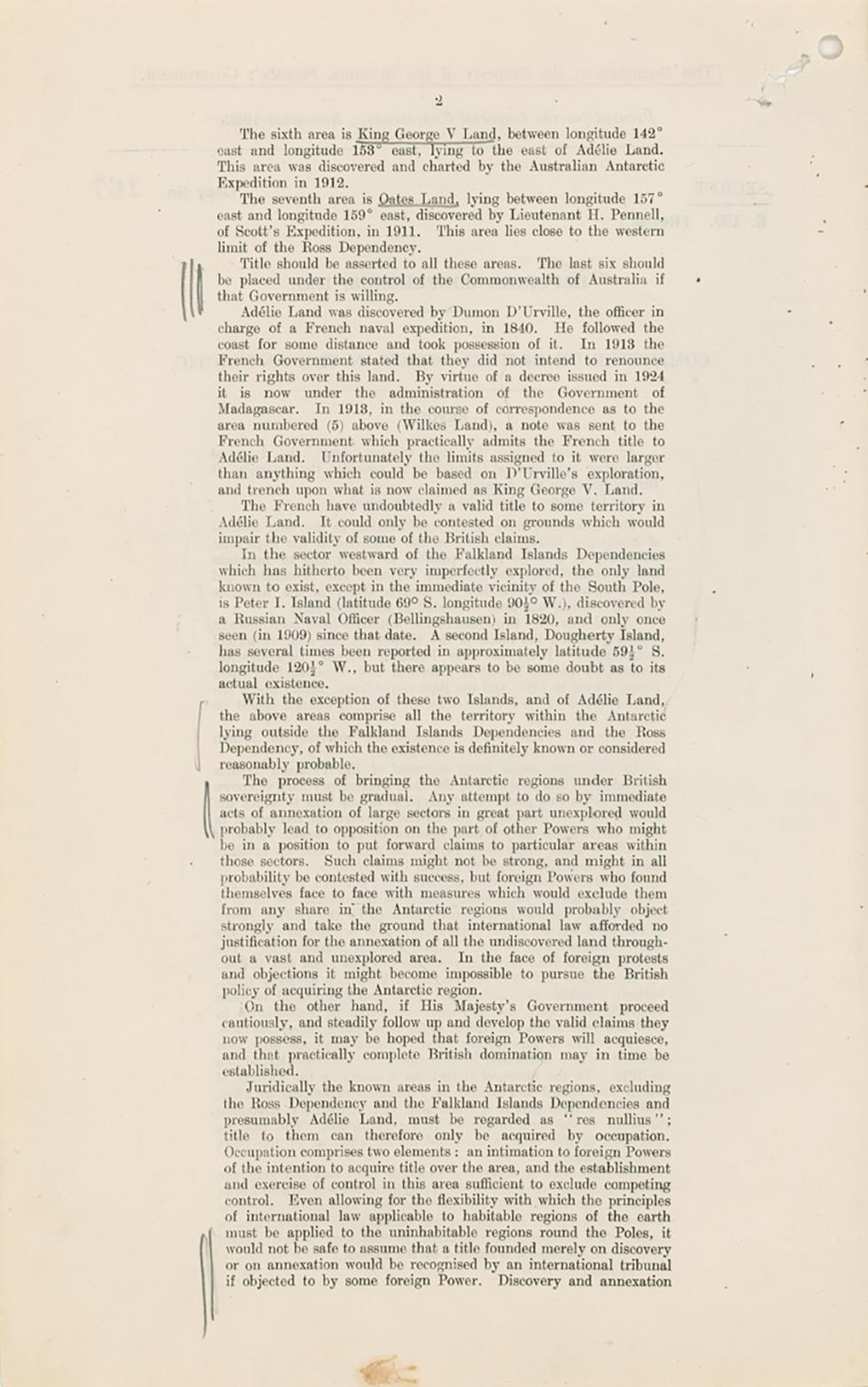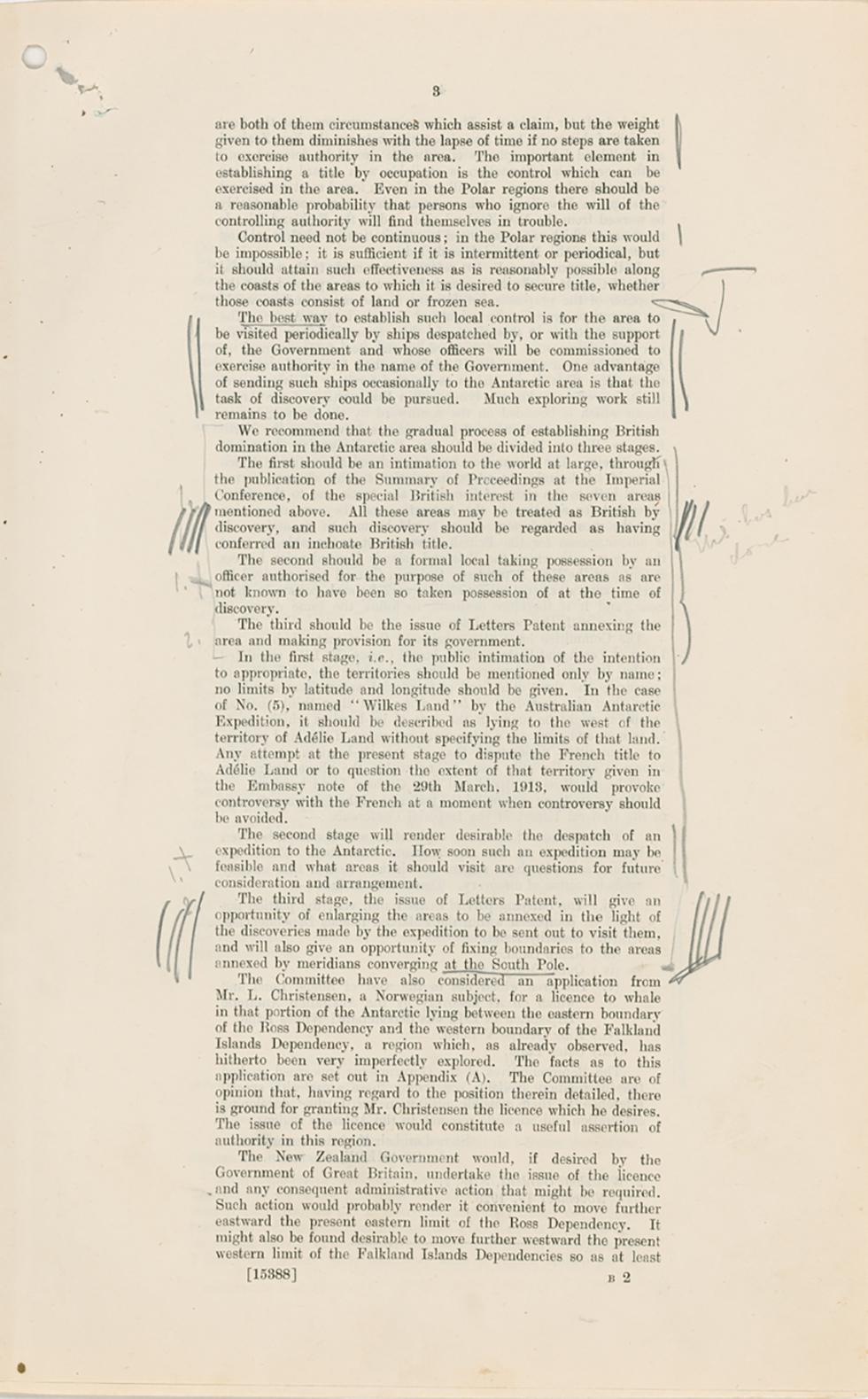

Aboriginal and Torres Strait Islander people should be aware that the National Archives' website and collection contain the names, images and voices of people who have died.
Some records include terms and views that are not appropriate today. They reflect the period in which they were created and are not the views of the National Archives.



[Page 1.]
[Page] 2.
The sixth area is King George V Land [location underlined by hand], between longitude 142 [degrees] east and longitude 153 [degrees] east, lying to the east of Adélie Land. This area was discovered and charted by the Australian Antarctic Expedition in 1912.
The seventh area is Oates Land [location underlined by hand], lying between longitude 157 [degrees] east and longitude 159 [degrees], discovered by Lieutenant H. Pennell, of Scott's Expedition, in 1911. This area lies close to the western limit of the Ross Dependency.
Title should be asserted to all these areas. The last six should be placed under the control of the Commonwealth of Australia if that Government is willing. [3 vertical lines hand drawn in left margin alongside sentence.]
Adélie Land was discovered by Dumon D'Urville, the officer in charge of a French naval expedition, in 1840. He followed the coast for some distance and took possession of it. In 1913 the French Government stated that they did not intend to renounce their rights over this land. by virtue of a decree issued in 1924 it is now under the administration of the government of Madagascar. In 1913, in the course of correspondence as to the area numbered (5) above (Wilkes Land). a note was sent to the French Government which practically admits the French title to Adélie Land. Unfortunately the limits assigned to it were larger than anything which could be based on D'Urville's exploration, and trench upon what is now claimed as King George V. Land.
The French have undoubtedly a valid title to some territory in Adélie Land. It could only be contested on grounds which would impair the validity of some of the British claims.
In the sector westward of the Falkland Islands Dependencies which has hitherto been very imperfectly explored, the only land known to exist, except in the immediate vicinity of the South Pole, is Peter I. Island (latitude 69 [degrees] S [South]. Longitude 90 1/2 [degrees] W [West].), discovered by a Russian Naval Officer (Bellinghausen) in 1820, and only once seen (in 1909) since that date. A second Island, Dougherty Island, has several times been reported in approximately latitude 59 1/2 [degrees] S. [South] longitude 120 1/2 [degrees] W. [West], but there appears to be some doubt as to its actual existence.
With the exception of these two Islands and of Adélie Land, the above areas comprise all the territory within the Antarctic lying outside the Falkland Islands Dependencies and the Ross Dependency, of which the existence is definitely known or considered reasonably probable. [Hand drawn line alongside sentence in left margin.]
The process of bringing the Antarctic regions under British sovereignty must be gradual. Any attempt to do so by immediate acts of annexation of large sectors in great part unexplored would probably lead to opposition on the part of other Powers who might be in a position to put forward claims to particular areas within those sectors. [2 hand drawn lines in left margin alongside previous sentences.] Such claims might not be strong, and might in all probability be contested with success, but foreign Powers who found themselves face to face with measures which would exclude them from any share in the Antarctic regions would probably object strongly and take the ground that international law afforded no justification for the annexation of all the undiscovered land throughout a vast and unexplored area. In the face of foreign protests and objections it might become impossible to pursue British policy of acquiring the Antarctic region.
On the other hand, if His Majesty's Government proceed cautiously, and steadily follow up and develop the valid claims they now possess, it may be hoped that foreign Powers will acquiesce, and that practically complete British domination may in time be established.
Juridically the known areas in the Antarctic regions, excluding the Ross Dependency and the Falkland Islands Dependencies and presumably Adélie Land, must be regarded as '"res nullius"; title to them can therefore only be acquired by occupation. Occupation comprises two elements: an intimation to foreign Powers of the intention to acquire title over the area, and the establishment and exercise of control in this area sufficient to exclude competing control. Even allowing for the flexibility with which the principles of international law applicable to habitable regions of the earth must be applied to the uninhabitable regions around the Poles, it would not be safe to assume that a title founded merely on discovery on annexation would be recognised by an international tribunal if objected to by some foreign Power. [2 hand drawn lines in left margin alongside previous sentence.] Discovery and annexation
[Page 2.]
[Page] 3.
[continuation of page 1: Discovery and annexation...]
are both of them circumstances which assist a claim, but the weight given to them diminishes with the lapse of time if no steps are taken to exercise authority in the area. The important element in establishing a title by occupation is the control which can be exercised in the area. Even in the Polar regions there should be a reasonable probability that persons who ignore the will of the controlling authority will find themselves in trouble.
Control need not be continuous; in the Polar regions this would be impossible; it is sufficient if it is intermittent or periodical, but it should attain such effectiveness as is reasonably possible along the coasts of the areas to which it is desired to secure title, whether those coasts consist of land or frozen sea.
The best way [underlined by hand] to establish such local control is for the area to be visited periodically by ships despatched by, or with the support of, the Government and whose officers will be commissioned to exercise authority in the name of the Government. One advantage of sending such ships occasionally to the Antarctic area is that the task of discovery could be pursued. Much exploring work still remains to be done. [2 hand drawn lines bracketing this paragraph.]
We recommend that the gradual process of establishing British domination in the Antarctic area should be divided into three stages.
The first should be an intimation to the world at large, through the publication of the Summary of Proceedings at the Imperial Conference, of the special British interest in the seven areas mentioned above. All these areas may be treated as British by discovery, and such discovery should be regarded as having conferred an inchoate British title. [4 hand drawn lines bracketing this sentence, with handwritten addition: 'this has been done.']
[handwritten; '1.'] The second should be a formal local taking possession by an officer authorised for the purpose of such of these areas as are not known to have been so taken possession of at the time of discovery.
[handwritten: '2.'] The third should be the issue of Letters Patent annexing the area and making provision for its government.
In the first stage, i.e., the public intimation of the intention to appropriate, the territories should be mentioned only by name; no limits by latitude and longitude should be given. In the case of No. (5), named "Wilkes Land" by the Australian Antarctic Expedition, it should be described as lying to the west of the territory of Adélie Land without specifying the limits of that land. Any attempt at the present stage to dispute the French title to Adélie Land or to question the extent of that territory given in the Embassy note of the 29th March. 1913, would provoke controversy with the French at a moment when controversy should be avoided.
The second stage will render desirable the despatch of an expedition to the Antarctic. How soon such an expedition may be feasible and what areas it should visit are questions for future consideration and arrangement.
The third stage, the issue of Letters Patent, will give an opportunity of enlarging the areas to be annexed in the light of the discoveries made by the expedition to be sent out to visit them, and will also give an opportunity of fixing boundaries to the areas annexed by meridians converging at the South Pole [location underlined by hand]. [4 hand drawn lines bracketing this paragraph.]
The Committee have also considered an application from Mr. L. Christensen, a Norwegian subject, for a licence to whale in that portion of the Antarctic lying between the eastern boundary of the Ross Dependency and the western boundary of the Falkland Islands Dependency, a region which, as already observed, has hitherto been very imperfectly explored. The facts as to this application are set out in Appendix (A). the Committee are of opinion that, having regard to the position therein detailed, there is ground for granting Mr. Christensen the licence which he desires. The issue of the licence would constitute a useful assertion of authority in this region.
The New Zealand Government would, if desired by the Government of Great Britain, undertake the issue of the licence and any consequent administrative action that might be required. Such action would probably render it convenient to move further eastward the present eastern limit of the Ross Dependency. It might also be found desirable to move further westward the present western limit of the Falkland Islands Dependencies so as at least
(15388)
B2
Learn how to interpret primary sources, use our collection and more.
